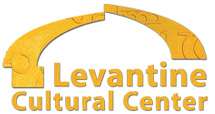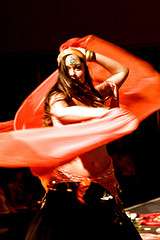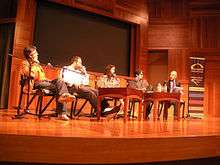The Levantine Cultural Center







The Levantine Cultural Center, is a nonprofit organization founded in June 2001. The center, located in West Los Angeles, champions a greater understanding of the Middle East and North Africa by presenting artistic and educational programs that bridge political and religious gaps. The Markaz fosters discussions among artists and thinkers, and offers classes and workshops that serve ethnic communities. The organization lost 501(c)(3) status on April 15, 2014, for failing to file Form 990s for three consecutive years.[1] The Levantine Cultural Center changed its name to The Markaz at the end of June 2015.[2]
Stance on Middle East Peace
Many Israelis and Palestinians have come to the conclusion that there is simply no violent solution to the conflict, and that only a peaceful and just negotiated settlement will bring about change in the region. With them, The Markaz supports only non-violent approaches to cross-cultural understanding.
History
Founded in 2001 by a group of activists, artists and business professionals, The Markaz presents artistic, educational, and outreach programs to bridge political and religious divides, and provide a greater understanding of the MENA (Middle East and North Africa) regions for both the general public and the media. These programs address ethnic and cultural fears within the U.S., as well as the conflicts in the regions, including Iraq, Afghanistan, Iran, and the Israeli/Palestinian conflict. The founding board members sought to connect the disparate arts and cultural groups scattered throughout Southern California and promote a better understanding and awareness of Middle Eastern cultures in the community at large. The center has produced over 500 programs and co-produced another 75 since its inception; between 2001 and 2006 alone, the center's programs were attended by over 25,000 individuals.
Board of Directors
According to its website and public information, there is currently no Board of Directors.[3]
National Advisory Board
The center has a national advisory board with many prominent figures including Ammiel Alcalay, Sinan Antoon, Reza Aslan, Peter Cole, Alev Croutier, Nathalie Handal, Tom Hayden, Bana Hilal, Elias Khoury, Laila Lalami, Mark LeVine, Saree Makdisi, Heather Raffo, Ella Habiba Shohat and Sholeh Wolpé.
Cultural Ambassadors
Among the center's cultural ambassadors are Ahmed Ahmed, Sussan Deyhim, Maz Jobrani, Mohja Kahf, Raya Meddine and Necar Zadegan.
Giving and Memberships
The Markaz is an independent not-for-profit organization that presents the arts and cultures of the Middle East and North Africa. According to the IRS, the federal tax exemption of this organization was automatically revoked on April 15, 2014.[1]
Artistic Programs
The center produces or cosponsors artistic programs that encourage cross-cultural and multidisciplinary collaborations, and that give voice to issues and experiences of underrepresented Middle Eastern communities in order to bring informative and alternative information on these communities to the American public and media. By curating public arts programs that integrate any number of genres, including literature, film, painting, photography, music, comedy, drama, the organization seeks to nurture emerging talent and foster discussions among artists and thinkers.
The center's "Exiles", an Iraqi Exhibition, showing the works of Paul Batou, and Faris Al-Saffar, New Voices in Middle Eastern Cinema Series, funded with support from the Hollywood Foreign Press Association has presented several feature films and documentaries, including The Infidel, The Taqwacores, View From a Grain of Sand, Outside the Law and Lebanon.
Past Projects
- "Inside/Outside Gallery"
One of the first galleries to explore contemporary art by Middle Eastern/American artists, who are both inside/outside the American mainstream, exhibitions include "Inside/Outside & Other Oxymorons", which in 2009 explored the work of three multicultural artists— Sama Alshaibi, Vahé Berberian and Adnan Charara—whose lives of migration and experiences with war, displacement and political instability have given them a unique perspective on identity, culture and society. Their work is created and inspired from the space of the in-between; from the inside and outside of multiple cultures and perspectives. Using diverse mediums, these artists’ works are an expression of their respective journeys. The Inside/Outside Gallery at Levantine Cultural Center presented 30 of their works from June 20-July 31, 2009. This was the first time any of these works had been exhibited in Los Angeles. Other shows include "Baghdadisms" by Faris Al-Saffar (2009), "East-West Convergences," a two-woman show with 24 paintings by Kinda Hibrawi and Nouha Sinno (2010), and "Swimming Up the Nile," with 28 works by Olfet Agrama, an Egyptian American painter.
- "Artists for Iran"
In December 2009, the center presented an extensive roster of artists and performers in "Artists for Iran," a celebration of the arts and human rights in conjunction with United4Iran.org, which coordinated related programs in 27 cities worldwide. Combining cultural diplomacy and human rights, the exhibit and performance art event came on the heels of International Human Rights Day.
- [East/West Convergences featured artists from Syria and Lebanon and highlighted the eloquence and interconnectedness of Arab and Western cultures.
- Hammer Museum’s “It Is What It Is: Conversations About Iraq”
Participating in the installation “It Is What It Is” (April/May 2009) and consulting for the Hammer Museum, the center assembled a unique cast of real Iraqi people and Americans who served or reported from Iraq following the 2003 U.S. invasion.
- The Immigrant Experience Workshop
The center in association with The Writing Studio presented a series of four writing classes with Elana Golden.
Author Talks
Authors, artists and producers have collaborated with the center.[4][5]
Film Series
The center produces the monthly New Voices in Middle Eastern Cinema series, cosponsored by the Hollywood Foreign Press Association and other partners. The center has partnered with independent distributors as well as the AFI International Film Festival, the Arab Film Festival, the Noor Iranian Film Festival, the Los Angeles Film Festival, and the South East European Film Festival, to further emphasize the center's commitment to support independent Middle Eastern filmmakers. Not only does the center provide logistical and promotional support to domestic festivals, it seeks to partner with festivals in the Middle East, helping them gain exposure. Further, the center reaches out to film commissions, broadening relationships and strengthening the bridge between Los Angeles and the Middle East. Some past film programs of the center are:
- Niloofar, a film by Sabine El Gemayel | Mobina Aynehdar as Niloofar. El Gemayel discusses the challenges of shooting on location in Iran in 2008 with Jordan Elgrably - artistic director for the center, and the screening cosponsor. This Franco-Iranian production includes Roya Nownahali, Shahab Hosseini, Hengameh Ghaziani, Mobina Ayenedar, Amir Aghai, Sadegh Safai, and Fatemeh Motamed Aria.
An image from the film "America So Beautiful" (91 ms) follows the odyssey of a group of Iranian immigrants in Los Angeles, trying to find their place in America amidst the unfolding of the 1979 Iran hostage crisis. The film stars many well-known Iranian American actors in the community, among them Shohreh Aghdashloo, Hooshang Touzie, and Fariborz David Diaan.
- The Wedding Song Le Chant des Mariées
The Los Angeles Jewish Film Festival and the center presented a special Director's Screening of Karen Albou's "The Wedding Song," about Muslim and Jewish friends in Tunisia.
- Amreeka, the Arabic word for "America" is now the name of an internationally acclaimed film. Center and community partners including the Muslim Public Affairs Council, the Progressive Jewish Alliance, and the Network of Arab American Professionals-L.A]. joined forces on Monday evening, September 7, 2009 for a special director's screening of "Amreeka."
- "Laila's Birthday", written and directed by Rashid Masharawi, was presented by the center on September 18, 2009, followed by discussion with Palestinian writer/director Hanna Elias (The Olive Harvest), at Laemmle's Music Hall.
- The Levantine Film Circle was launched with new monthly series, beginning October 18, 2009 with two Los Angeles premieres - the feature "Driving to Zigzigland" and the short - "When the Voices Fade", to rally around the common commitment against clichés about Arabs and the Middle East.
- "La Graine et le Mulet" by Abdellatif Kachiche
A post-film audience discussion was led by the center's artistic director, Jordan Elgrably, whose family emigrated from Morocco to France, and Pani Norindr, Associate Professor of French & Comparative Literature, and Chair of the department of Comparative Literature at USC.
- The Stoning of Soraya M. (USA, 116 ms), with director Cyrus Nowrasteh and stars Mozhan Marnò and Navid Neghaban, along with David Diaan, were part of the center's "New Voices in Middle Eastern Cinema" series.
Public Forums on Identity, Politics, and Culture
- "Whither the Levant?" The Crisis of the Nation-State: Lebanon, Israel, Palestine
The conference included documentary and feature screenings, panels and symposia, and was organized by the center at the University of California, Irvine, with support from the Middle East Studies Student Initiative (MESSI). Cosponsored by the Center for Global Peace and Conflict Studies/UCI, American Friends Service Committee, LA Jews for Peace and supported by Diane and Jeanette Shammas, Lawrence Joseph, Kanan Hamzeh, Casey Kasem, Bana Hilal, Asad Farah and the Salaam-Shalom Educational Foundation.
- American Arab/Muslim Comedy, A Panel Discussion at U Penn
The Middle East Center University of Pennsylvania Philadelphia This panel discussion and lecture series was sponsored by The Middle East Center at the University of Pennsylvania, and explored the landscape of American Middle Eastern ethnic comedy and its intricate relationship with Islamophobia. Cosponsored by UPenn Jewish Studies, the South Asia Center, and African Studies. Panel Members: Mucahit Bilici (Professor of Sociology at John Jay College-CUNY), Jordan Elgrably (Founder of The Merkaz, and the Sultans of Satire: Middle East Comic Relief) and Dr. Armat (of Kodoom Cultural Events Search Engine). Featuring the Sultans of Satire with Mike Batayeh, Elham Jazab, and Noel Elgrably, speaking before their shows in Philadelphia and Washington DC.
Cultural Context
The center includes majority and minority cultures, stretching from the historical Al-Andalus of southern Spain and Morocco to the Balkans, Greece, Turkey and across North Africa and the Middle East as far as Afghanistan and Pakistan. It includes the creative work of Arabs, Jews and other ethnic/religious groups with Mideast origins who are living in the West.
Sponsors/Partners
Sponsors of the center include Aslan Media, The Broad Stage, Code Pink, Hammer Museum, LACMA, Muslim Public Affairs Council, and the World Festival of Sacred Music.
References
- 1 2 "Automatic Revocation of Exemption Information". irs.gov. 2015-04-13. Retrieved 2016-08-02.
- ↑ "History of the Markaz". themarkaz.org. Retrieved 2016-08-02.
- ↑ "The Markaz". Retrieved 2016-06-30.
- ↑ "Israel, Palestine: One State, Two or a Third Way?". youtube.com. 2010-01-18. Retrieved 2016-08-02.
- ↑ "Bridging America and the Middle East: Part 2". youtube.com. 2010-01-05. Retrieved 2016-08-02.